Introduction
The story of the Tower of Babel, one of the most well-known narratives in the Bible, takes place after the Flood. Humanity, which had survived through Noah and his family, begins to expand again over the earth. The population grows, and everyone shares the same language and the same goal: to build a tower that reaches the heavens. However, this search for power and self-affirmation leads to the direct intervention of God, who observes human behavior and decides to confuse the languages of men, scattering them throughout the earth. The story carries profound lessons about pride, divine sovereignty, and human diversity.
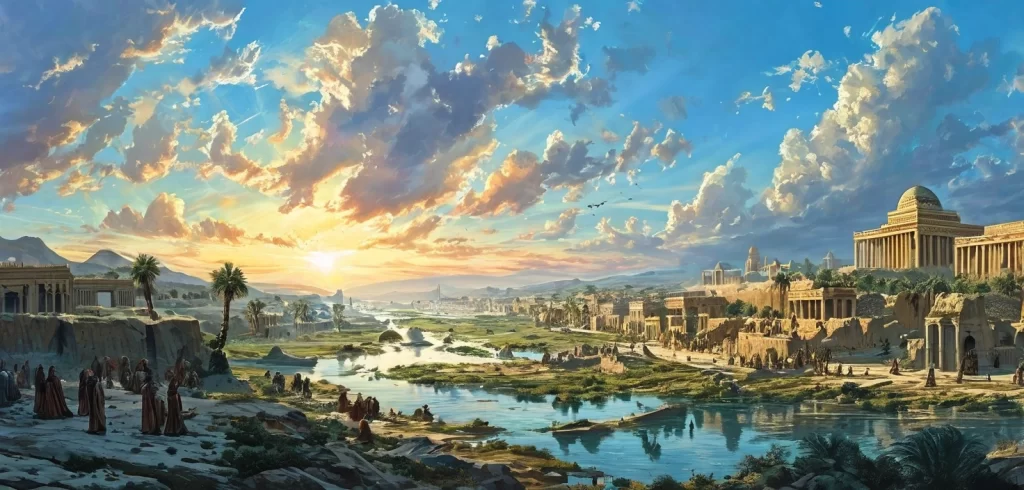
The story of Babel begins with humanity rebuilding after the great flood. With all survivors descended from Noah and speaking a single language, communication is easy and ambitions are great. The Tower of Babel is not only an attempt to build a grand physical structure, but also a symbol of human pride, desire for power, and the attempt to overcome the limitations imposed by God. Throughout this journey, humanity tries to equal God and challenge the established order, but this will ultimately result in catastrophe.
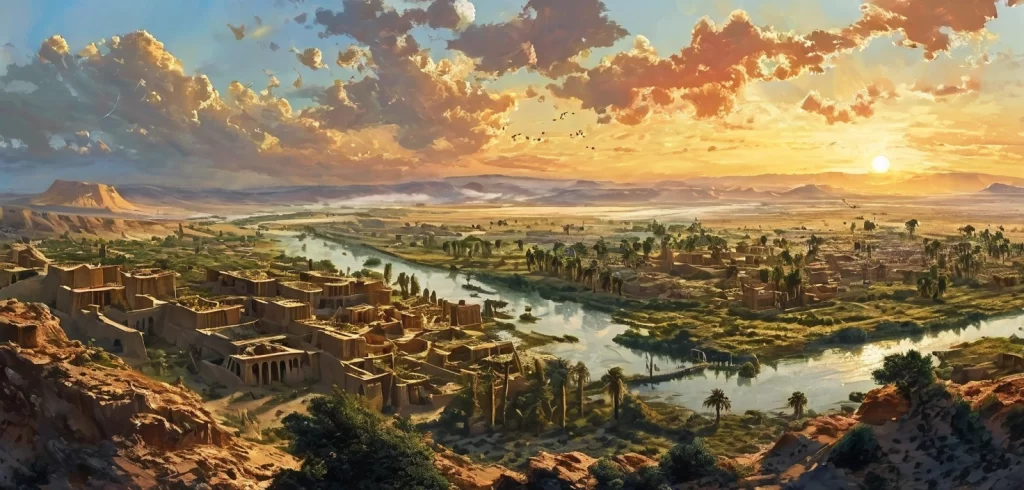
The Reconstruction of Humanity
After the Flood, humanity begins to multiply again. Noah and his sons have children and grandchildren, and people begin to spread across the earth. Everyone speaks the same language, which allows perfect communication between them. People begin to organize themselves, founding villages and cities. However, in a time of great prosperity, a group of individuals, driven by ambition and the desire to build something lasting, decide to settle on the plain of Shinar (Mesopotamia). The region offers an abundance of resources, and men see it as an ideal place to realize their greatest aspirations.
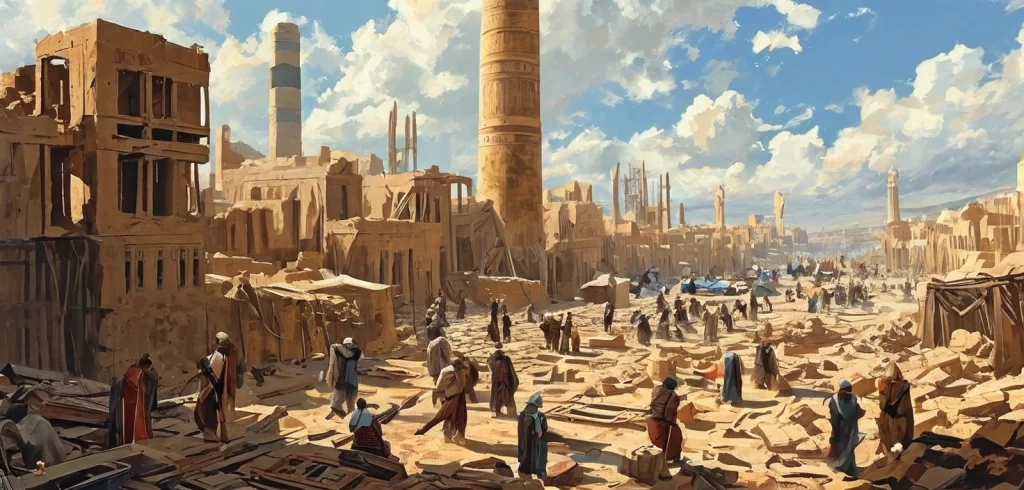
They have a grand dream: to build a tower that reaches the sky. A tower that would not only be an architectural marvel, but also a symbol of power, unity, and self-sufficiency. This tower would not only be a physical work, but would represent the human desire to achieve immortality and even to be equal to God. The builders believe that if they could reach the sky, they could overcome the limitations of mortality and obtain absolute power, without needing divine help. Thus, with the unity of a single language, the tower begins to be built.
The process of building the tower is described as a collective effort, in which all men and women collaborate. They use burnt bricks and bitumen to lay them, creating a sturdy structure. The work progresses quickly, and the ambition behind it grows. The inhabitants of the region begin to see the tower not only as an architectural project, but also as a way of asserting human control and superiority over the rest of creation.
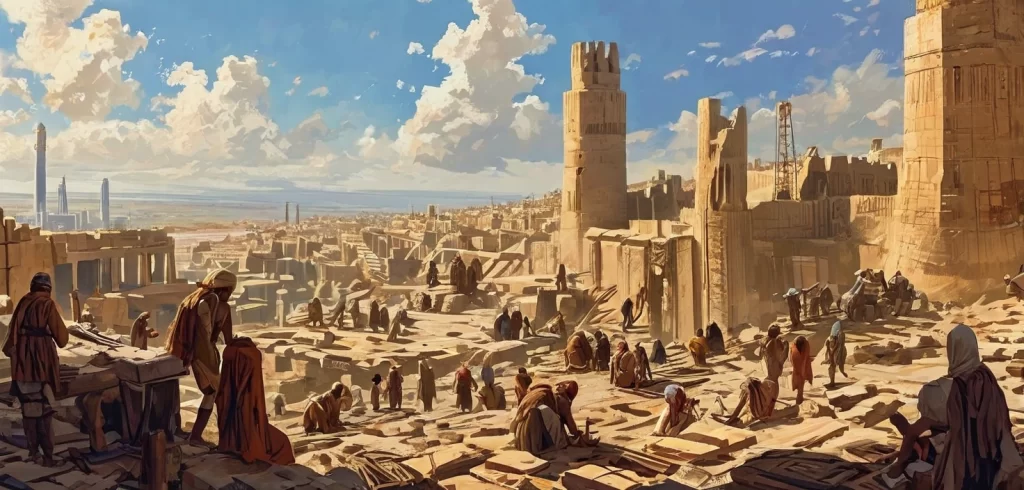
However, doubts arise throughout this effort. Some begin to question the true intentions behind the construction, while others feel the weight of responsibility. Even so, most of those involved remain focused on the end goal, unaware of the dangers of their desire for greatness.
Human Pride and Divine Sovereignty
As the tower grows, so does the confidence of the builders. The desire to build a structure that would touch the heavens begins to be seen as a divine and indisputable goal. The tower is more than a building; it becomes a symbol of human power, of the ability to achieve anything without depending on God. Men sense that by reaching heaven, they will be able to challenge the established order and even “become like God.”
God, observing this development, realizes the arrogance of human beings. He understands that the attempt to reach heaven is not a search for knowledge or wisdom, but an attempt to overcome human limitations and seek absolute power. Divine sovereignty, which had been established since creation, is now challenged. Human pride reaches its peak, and humanity, in its quest for power, begins to build something that reflects its inflated ego.
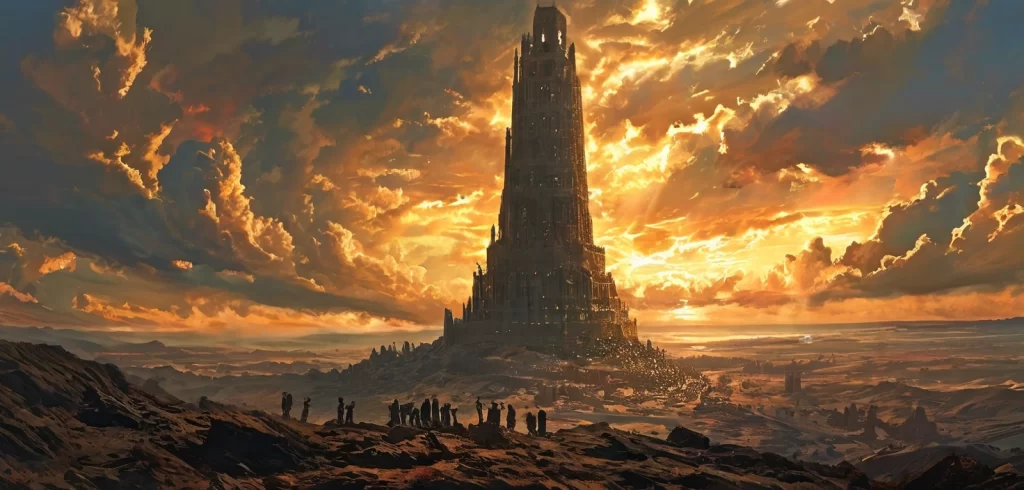
In response to this behavior, God decides to act. Not with direct violence, but in a way that frustrates the project without completely destroying the tower. He chooses to confuse the languages of men. What was once a fluid and barrier-free communication becomes incomprehensible. Suddenly, men and women who were united by the same goal can no longer understand each other. Words no longer make sense, and the work, which seemed destined for success, begins to crumble under the weight of disorder.
Communication breaks down, and the construction of the tower is interrupted. The unity that once existed is undone, as each group begins to speak a different language. There is no longer consensus among the workers, and, without the ability to coordinate efforts, the project is abandoned. The confusion of languages is a direct punishment for human pride, which had tried to reach heaven without humility. Men’s egos have been crushed by the very limitations of their communication.
By confusing the languages, God not only interrupts the project, but also establishes a barrier that prevents humanity from remaining unified. This linguistic barrier becomes a symbol of separation, diversity and, paradoxically, the very plurality that would come to characterize human civilization.
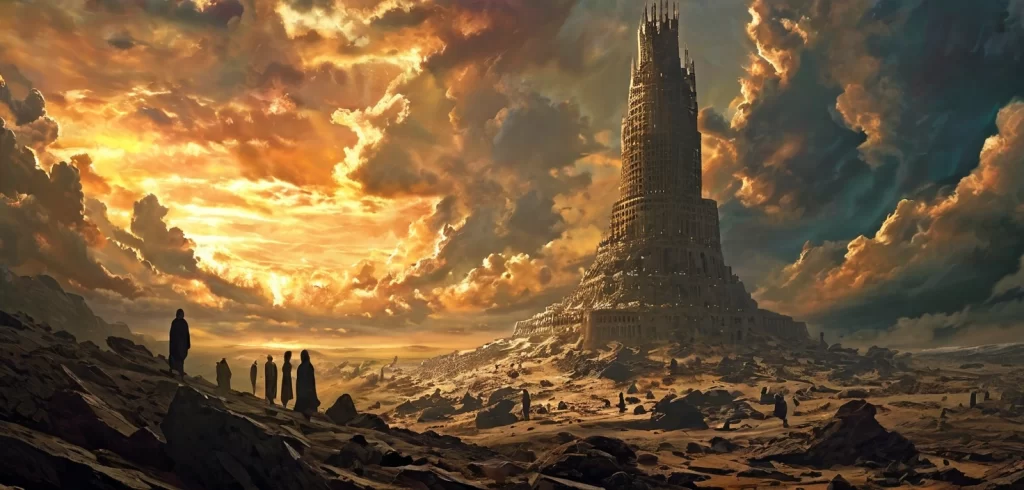
The Dispersion of Peoples and Linguistic Diversity
With the destruction of the Tower of Babel project, humanity finds itself divided. Men, now unable to understand each other due to the confusion of languages, begin to separate into groups. These groups, speaking different languages, spread throughout the world, forming new nations and cultures. Instead of remaining united in a single global empire, humanity divides, generating a plurality of languages and civilizations.
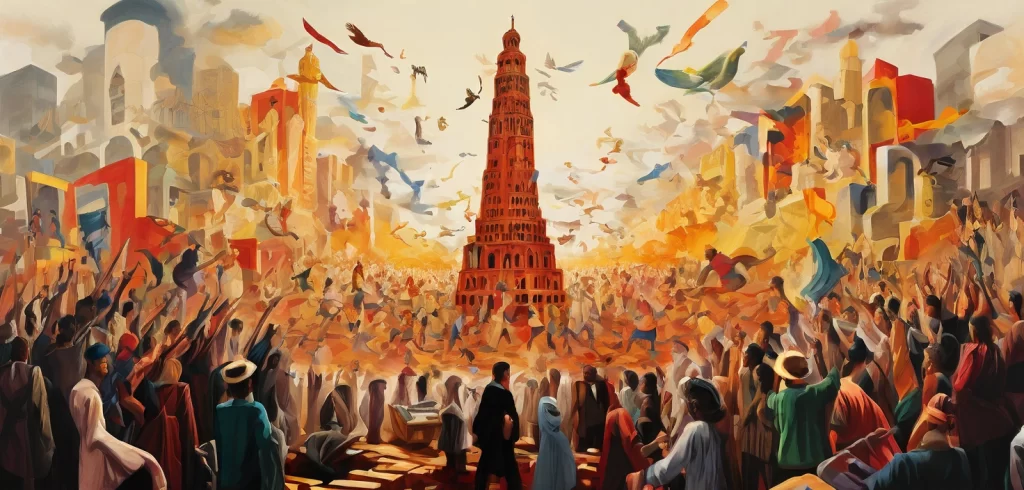
The dispersion of peoples is a direct consequence of divine intervention. The linguistic and cultural diversity that emerged after the failure to build the tower is seen as a reflection of a divine need to maintain order. The attempt at forced unification of mankind was interrupted by God, because the unity desired by mankind was not based on true brotherhood, but on pride and the desire for control. Each group settles in different regions, forming new peoples with their own traditions, beliefs and systems of government. The language that once united everyone now separates and defines new identities. This dispersion is seen as the beginning of civilizations, with the emergence of different cultures and ways of life. However, while the confusion of languages is a punishment, it also serves as a lesson. The linguistic and cultural diversity resulting from the Tower of Babel ends up enriching the world. Different cultures develop their own forms of art, philosophy and religion, each bringing its own unique contribution to the panorama of humanity. However, separation also generates tensions and conflicts, as the lack of mutual understanding often results in misunderstanding and hostility between peoples.
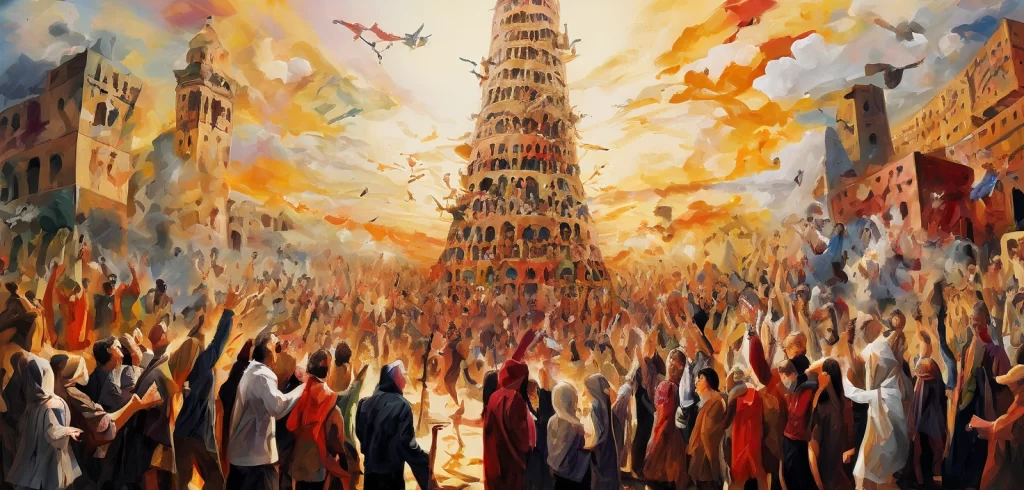
The Legacy of Babel and the Human Challenge
The story of the Tower of Babel has a profound legacy for humanity. It teaches us about the dangers of human pride and the insatiable quest for power. The design of the tower represents the attempt to control the uncontrollable, to become superior to one’s own creation. But at the same time, the confusion of languages also brings to light the idea that humanity is, in fact, limited, and this limitation is part of the divine plan.

What began as a desire for power and self-sufficiency ends up resulting in the creation of a diversity that, paradoxically, is both a blessing and a curse. Humanity, now divided, must learn to live with its differences. Separation, although seen as a punishment, is also an opportunity for growth and the development of new ways of life and understanding.
The story of the Tower of Babel is a reflection on the temptation to elevate oneself above others and on the limits of human power. It teaches us that true unity and true progress come not from the pursuit of domination or supremacy, but from the acceptance of diversity and human limitations. Even in the face of confusion, human beings are called to seek understanding, reconciliation and harmony, respecting differences and recognizing that true greatness lies in humility and peaceful coexistence.
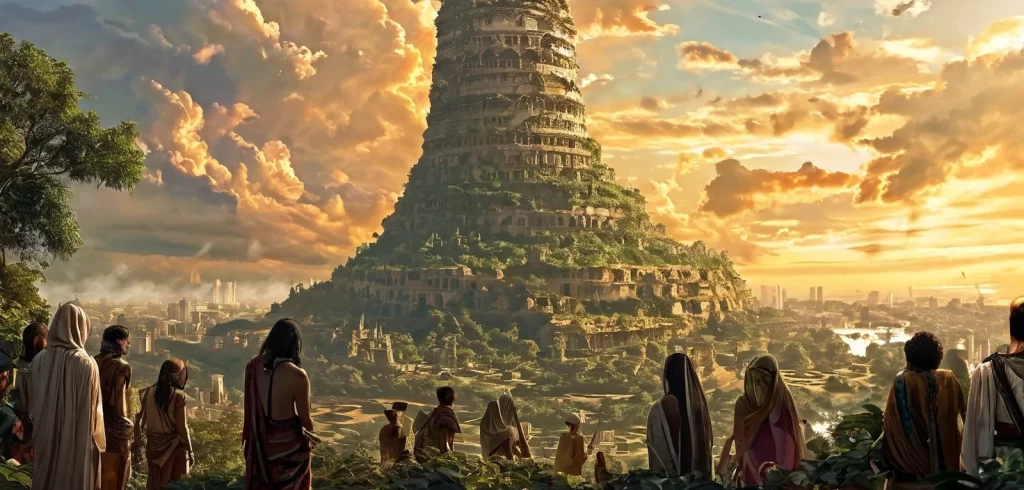
Conclusion
The story of Babel remains relevant today, teaching us about humanity’s failings and the limits of arrogance. In trying to build a tower that would reach the sky, humans not only failed, but were also scattered across the earth, creating the linguistic and cultural diversity that defines the world today. Babel teaches us about the price of pride and the importance of humility before God and creation.
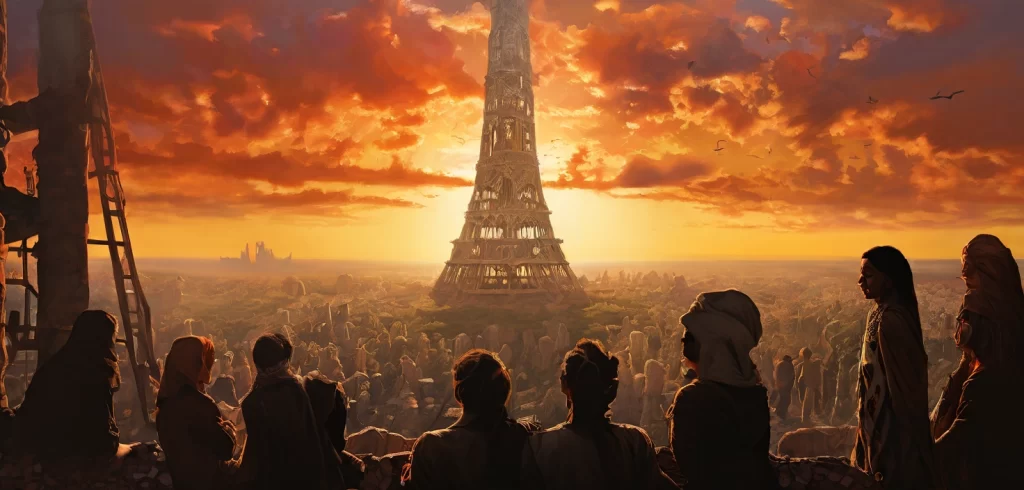
However, the story of Babel is also a story of hope. It reminds us that despite divisions and challenges, humanity has the ability to learn from its mistakes and seek a path of understanding and cooperation. Diversity, although it arose as a consequence of human pride, can be a means of growth and evolution. By respecting differences and working together, we can overcome the obstacles created by separation and build a more harmonious and just world.
Tags: Torre de Babel, história bíblica, Gênesis, orgulho humano, soberania divina, diversidade linguística, humildade, humanidade, Babel, confusão das línguas, pluralidade cultural, lições bíblicas, moral da história, reflexão bíblica, civilizações antigas, Mesopotâmia



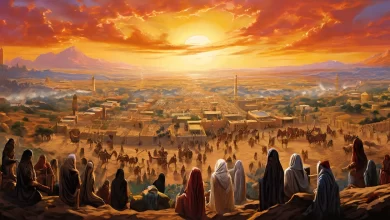
Essa história aqui é muito lindo de se ler.
Gostei mesmo posta mais assim com imagens.